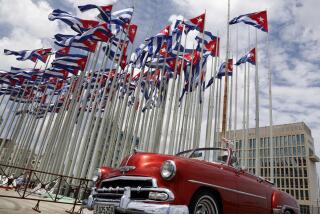Czechs Evict Cubans From Embassy in U.S. : Diplomacy: It’s getting harder for a Communist country to find a sponsor in Washington.
WASHINGTON — Cuba’s low-level diplomatic mission to Washington, technically a tenant of the Czechoslovak Embassy since 1977, received an eviction notice Wednesday. The move could force Cuba to find another sponsor or lose its only official contact with the United States.
But, in yet another sign of how much the world has changed in the last year, the hard-line Communist nation may find that it has few allies willing to sponsor its interests section. Such sections are established by governments that do not have full diplomatic relations with a given country and operate under the sponsorship of nations that do.
Few old-style Communist governments are still represented in Washington for Cuba to approach. There has been speculation that Iraq might extend a welcome because the Cuban delegate to the Security Council defended Iraq in the United Nations.
Another potential sponsor would be Yemen, whose U.N. envoy joined Cuba to cast the only votes against a dozen U.N. resolutions involving Iraq.
Czechoslovak President Vaclav Havel came under pressure from U.S. congressional and human rights groups to drop the Cubans last December after he took office as leader of his country’s first non-Communist government in more than 40 years.
During a visit here earlier this year, Havel was asked about the Cuban sponsorship by Sen. Bob Dole (R-Kan.) and other legislators. Havel responded that his new government had higher priority problems.
But, as Daniel Vesely of the Czech Embassy confirmed Wednesday, “The Foreign Ministry today delivered notes to the U.S. and Cuban embassies in Prague, saying that the government of the Czech and Slovak Republic will no longer be responsible for the Cuban interests section in Washington.”
A State Department source said the United States finds the section “useful” in facilitating communications in the absence of normal diplomatic relations. He added, “It will be up to the government of Cuba to find an alternative host embassy.”
In Havana, a Foreign Ministry statement announced the change and said that another country will be sought to represent Cuba’s interests in the United States.
Freedom House, a human rights advocacy group headquartered in New York, led the drive to persuade the new Czech government to stop sponsoring the Cubans here. R. Bruce Malcolm, executive director of Freedom House, wrote to Havel last January protesting that Czechoslovakia continued to “represent in the United States a government which denies its citizens even the most fundamental human rights.”
Malcolm reminded Havel that Fidel Castro endorsed the Soviet invasion of Czechoslovakia in 1968 and “even today condemns the movement toward democracy throughout the world.”
Of Human Rights, a Washington-based group dedicated to attaining freedom for Cuban political prisoners, also asked Czechoslovakia to end its relationship with Castro.
The Cuban interests section-- two dozen diplomats and their families--is housed in the old, pre-Castro embassy in a diplomatic enclave in Washington. A brass plaque on the iron fence surrounding the building still reads “Embassy of the Czechoslovak Socialist Republic,” although the nation dropped the Socialist appellation after electing a non-Communist government.
Cuba broke relations with the United States in 1961 and had no links until it established its interests section under Czechoslovak sponsorship in 1977.
Like their American counterparts in Havana, the Cuban diplomats perform many of the functions of an embassy. The U.S. interests section in Cuba operates under the protection of the embassy of neutral Switzerland. No change is expected in its status.
The only other interests section now in Washington is Iran’s, which operates under the aegis of the Algerian Embassy.
More to Read
Sign up for Essential California
The most important California stories and recommendations in your inbox every morning.
You may occasionally receive promotional content from the Los Angeles Times.










